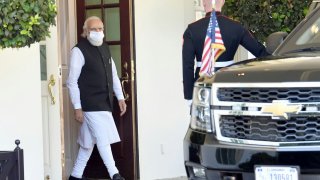Can the U.S.-India Relationship Last?
Washington and New Delhi may never be able to elevate their relationship above transactionalism.
Indians are also wary about the U.S.-led Western world’s close economic relationship with China. The entire narrative of the U.S.-China rivalry is questioned. Indian diplomats from the 1970s and 1980s believe that the United States created the Chinese behemoth that it now laments. If the United States had not facilitated China’s entry into WTO, Beijing would not have achieved such economic might. In many quarters, it is believed that the United States still considers Russia its real enemy, not China.
In February 2024, China remained the second largest holder of the U.S. government debt. The United States prefers “diplomacy over deterrence” to set the troubled relationship with China on the right course. China expert Brahma Chellaney opines that the U.S.’ goalpost has shifted backward from containing China to “managed competition.” In his Hanoi visit last September, Biden said that “we are not trying to hurt China” and the aim is “getting the relationship right.” Biden’s defense supplemental neglects the Indo-Pacific and the delayed production of Virginia class submarines, which shows that the United States does not take the China threat seriously.
In November 2023, Biden met Xi Jinping in a summit meeting in California. More recently, after her April 7, 2024, meeting with the Chinese Premier Li Qiang to resolve trade and economic issues, U.S. Treasury Secretary Janet Yellen opined that the U.S.-China relationship is on a “more stable footing.” For New Delhi, these periodic bouts of U.S.-China camaraderie are perplexing, adding more to its apprehensions about trusting the United States.
In the words of India’s eminent foreign policy expert, Dr. C. Raja Mohan, “The traditional fears in Delhi swing between two familiar extremes—that India will either be ‘entrapped’ or ‘abandoned’ by the U.S. in dealing with China.” India’s pessimism about the Western block is further strengthened by robust economic ties of the other prominent powerhouses of the Western camp with China. China recently opened an automobile factory in Hungary to bypass the EU’s protectionist policies against technologically superior Chinese cars. China continues to be Germany’s top trading partner. In 2023, German FDI in China rose to a record €12 billion.
Finally, the last factor that prevents India from effectuating a total re-alignment towards the United States is its geography. In 1971, the United States could not prevent the disintegration of Pakistan and the independence of Bangladesh because India, the lead actor, had the geographic advantage of a border with West Pakistan, allowing it to project decisive power. More recently, the United States could not help Ukraine against the Russian invasion. Hence, India’s security czars find no sanity in worsening ties with a powerful neighbor like China through a complete shift towards the West.
Dr. Abhinav Pandya is a founder and CEO of Usanas Foundation, an India-based geopolitical and security affairs think-tank, and the author of Radicalization in India: An Exploration and Terror Financing in Kashmir. He has a Ph.D. from OP Jindal University and an MPA from Cornell University. Follow him on X: @abhinavpandya.
Image: YashSD / Shutterstock.com.

